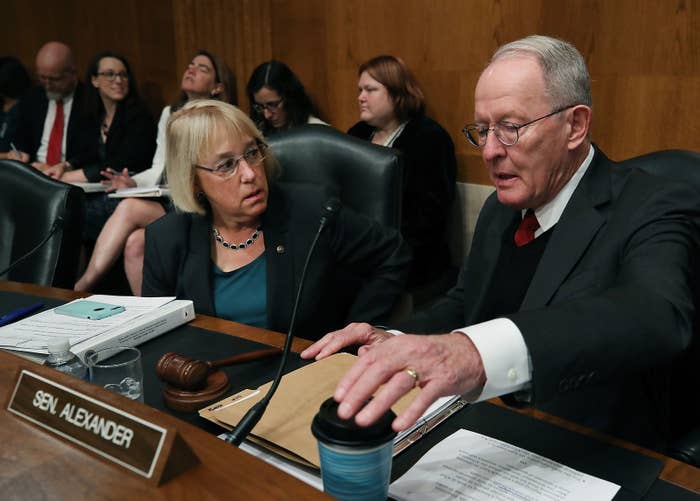
WASHINGTON — Now that Democrats have taken the House, there has been talk of reviving a bipartisan bill in the next Congress that could drastically lower insurance premiums for millions of people. But lingering political disputes over abortion language — the same disputes that killed the bill last time — mean this relief likely won’t come until 2021 at the earliest, if it comes at all.
Democratic Sen. Joe Manchin recently pitched President Trump on a plan to rebrand the bill in his image. Manchin said that during a one-on-one meeting at the White House on Wednesday, he told Trump to sell the bill as “Trump Repair Care.” With the power between the parties split in the legislative branch, politicians are eager to prove they can work together to fix, well, anything.
As ever, partisan politics can get in the way. Conversations with senators and staff reveal the two sides are nowhere close to a deal.
“Barring a miracle,” there is no chance a new stabilization bill passes before well into 2019 at the earliest, said a Democratic Senate staffer. By then, 2020 insurance rates would be set, making 2021 the earliest year that people could see price relief.
Known as the Alexander-Murray plan because it was negotiated between Senate Health Committee chair Lamar Alexander and ranking member Patty Murray, the stabilization bill hit a wall last year despite looking like a no-brainer on paper. It would have restored subsidies and lowered premiums by up to 20%, cost the federal government little, and given Republicans some loosening of the Affordable Care Act’s regulations.
But House Speaker Paul Ryan refused to allow a vote on the bill, saying that restoring ACA subsidies was “propping up Obamacare.” Then, in the Senate, Republicans insisted on a broader interpretation of the Hyde Amendment, which bans federal funding from paying for abortions. Democrats wanted a more narrow interpretation, and the talks fell apart. Both sides went into the midterm elections blaming the other for the failure.
In theory, it should be easier to pass the bill in January when Democrats take over the House and anti-Obamacare House Republicans lose their power to block the bill. Murray called for reviving the Alexander-Murray plan late last month at a Senate Health Committee meeting. “I’m really hopeful that we can revive discussions in the new Congress and find a way past the ideological standoffs of the past,” she said.
Alexander also called for a bipartisan approach to improving the health care system. But both sides are still at a hard impasse when it comes to funding for abortion coverage.
Currently, insurance plans can work around the Hyde Amendment by separating out premiums that pay for abortion coverage from premiums that pay for everything else. That way insurers can receive federal subsidies for the premiums that do not go to abortion coverage.
Under the Republicans’ preferred language, subsidies could not go to plans offering abortion coverage at all — even if it is paid for separately. Given how valuable the subsidies are, this would likely mean the end of plans covering abortion on the individual market. This is particularly problematic in California, New York, and Oregon, where state laws require insurance plans to provide abortion coverage.
Republicans are so far not wavering from their version of the Hyde Amendment, and Democrats still say they cannot accept this. But Murray and Alexander have a history of reaching deals, and staff say there is always hope some deal could be reached in the coming months. However, Murray confirmed Thursday that no bill will be passed in the immediate future.
There are other obstacles beyond the abortion issue. Democrats say that enough has changed in the year since the bill was negotiated that it would need to be substantially updated. Republicans say there is less desire in their conference to pass legislation now that the Trump administration has made moves to weaken Obamacare.

